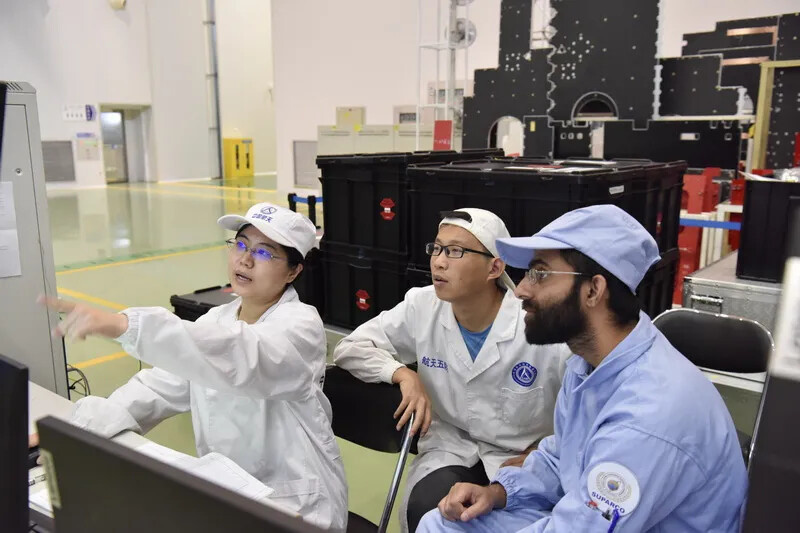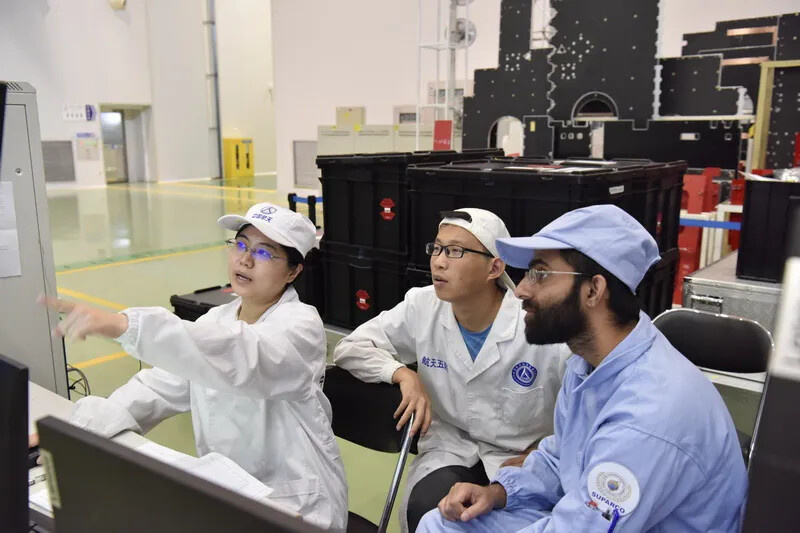By Shen Xiaoxiao, Song Yiran, People's Daily

Chinese and Pakistani scientists engage in discussions on the development of Pakistan's multi-mission communication satellite. (Photo by Xu Zhengqin)
At the Egyptian Space City, a gleaming white sphere rises above the complex - a futuristic beacon in the desert. Inside, the antenna of the satellite MISRSAT-2 quietly goes about its work: receiving, recording, storing, and transmitting data from orbit.
Launched in December 2023 from China's Jiuquan Satellite Launch Center, MISRSAT-2 marks a significant milestone in international space cooperation. The satellite is the fruit of a joint effort between Chinese and Egyptian governments, with simultaneous design work in both countries and assembly, testing and environment qualification taking place at the Egyptian Space City - built with Chinese assistance.
This achievement makes Egypt the first African country to have complete satellite assembly and testing capabilities, symbolizing China's ongoing commitment to expanding space cooperation.
As of December 2024, China had signed nearly 200 intergovernmental space cooperation agreements with more than 50 countries and international organizations, covering a wide range of fields such as Earth observation, deep space exploration, satellite development, lunar exploration, and crewed spaceflight. Through these partnerships, China's technological advancements are increasingly leveraged for the benefit of humanity.
"The high-resolution images provided by MISRSAT-2 have been applied in Egypt's urban planning, land resource surveys, crop monitoring, water resource management, and infrastructure development, all of which are integral to realizing Egypt's Vision 2030," said Sherif Sedky, CEO of the Egyptian Space Agency.
Egypt is home to the headquarters of the African Space Agency. "Our cooperation with China not only accelerates the growth of Egypt's space sector but also propels space technology forward across Africa," noted Tamer Talal, the Egyptian chief system designer of MISRSAT-2.
The effects of this cooperation extend well beyond North Africa. In Brazil's northern state of Para, real-time deforestation alerts - powered by data from the China-Brazil Earth Resources Satellite (CBERS) project - are enabling rapid responses against illegal mining and logging.
Since the project was launched in 1988, China and Brazil have jointly developed six earth-resource satellites, providing crucial data for natural resource management, agriculture, forestry, geology, water resources, urban planning, and environmental protection. The satellites have also helped monitor global disasters such as forest fires, floods, earthquakes and tsunamis.
During the severe rainstorms and floods in the southern Brazilian state of Rio Grande do Sul last April, data from CBERS-04 and CBERS-04A were instrumental in monitoring flood movements, mapping the damage, and helping officials assess the condition of urban infrastructure. The imagery proved invaluable in the Brazilian government's reconstruction planning.
"China-Brazil space cooperation is not only advancing science and technology in both countries - it is delivering benefits on a global scale," said Luciana Santos, minister of science, technology and innovation in Brazil.
Since 2003, with the launch of CBERS-02, China and Brazil have jointly provided 20-meter resolution satellite data free of charge to countries worldwide. Both the Brazilian Space Agency and the China National Space Administration have pledged to expand the distribution of this data to more regions, making space-based information a public good for global development.
Over in South Asia, Pakistan has witnessed a similar transformation. On May 11, 2024, a striking satellite image captured both the Sun and the Moon in a single frame - with lunar craters rendered in stark detail - captivating the Pakistani public and dominated national headlines.
The image was taken by ICUBE-Q, Pakistan's first lunar satellite, jointly developed by the Institute of Space Technology of Pakistan and China's Shanghai Jiao Tong University. Hitching a ride on China's Chang'e-6 lunar probe, and launched aboard a Long March 5 rocket, ICUBE-Q has since entered lunar orbit and begun transmitting telemetry data back to Earth.
This achievement is merely one highlight in an expanding chapter of China-Pakistan space collaboration. In recent years, satellites co-developed by both countries have begun reshaping multiple sectors within Pakistan, delivering measurable improvements in everyday life.
The Pakistan Remote Sensing Satellite (PRSS-1), another cooperation project between the two countries, now provides high-resolution Earth observation data for land surveys, environmental protection, disaster monitoring and management, crop yield estimation, and urban development.
Adding to this momentum, China launched a multi-mission communication satellite for Pakistan at its Xichang Satellite Launch Center in May 2024. Equipped with next-generation technology, the new satellite has significantly enhanced Pakistan's capabilities in satellite communication and navigation.
Qamarul Islam, a professor at the Institute of Space Technology of Pakistan, remarked that the long-standing, wide-ranging space cooperation between China and Pakistan has fostered deep mutual understanding and seamless collaboration among scientists from both nations, laying a solid foundation for future achievements.
Launched in December 2023 from China's Jiuquan Satellite Launch Center, MISRSAT-2 marks a significant milestone in international space cooperation. The satellite is the fruit of a joint effort between Chinese and Egyptian governments, with simultaneous design work in both countries and assembly, testing and environment qualification taking place at the Egyptian Space City - built with Chinese assistance.
This achievement makes Egypt the first African country to have complete satellite assembly and testing capabilities, symbolizing China's ongoing commitment to expanding space cooperation.
As of December 2024, China had signed nearly 200 intergovernmental space cooperation agreements with more than 50 countries and international organizations, covering a wide range of fields such as Earth observation, deep space exploration, satellite development, lunar exploration, and crewed spaceflight. Through these partnerships, China's technological advancements are increasingly leveraged for the benefit of humanity.
"The high-resolution images provided by MISRSAT-2 have been applied in Egypt's urban planning, land resource surveys, crop monitoring, water resource management, and infrastructure development, all of which are integral to realizing Egypt's Vision 2030," said Sherif Sedky, CEO of the Egyptian Space Agency.
Egypt is home to the headquarters of the African Space Agency. "Our cooperation with China not only accelerates the growth of Egypt's space sector but also propels space technology forward across Africa," noted Tamer Talal, the Egyptian chief system designer of MISRSAT-2.
The effects of this cooperation extend well beyond North Africa. In Brazil's northern state of Para, real-time deforestation alerts - powered by data from the China-Brazil Earth Resources Satellite (CBERS) project - are enabling rapid responses against illegal mining and logging.
Since the project was launched in 1988, China and Brazil have jointly developed six earth-resource satellites, providing crucial data for natural resource management, agriculture, forestry, geology, water resources, urban planning, and environmental protection. The satellites have also helped monitor global disasters such as forest fires, floods, earthquakes and tsunamis.
During the severe rainstorms and floods in the southern Brazilian state of Rio Grande do Sul last April, data from CBERS-04 and CBERS-04A were instrumental in monitoring flood movements, mapping the damage, and helping officials assess the condition of urban infrastructure. The imagery proved invaluable in the Brazilian government's reconstruction planning.
"China-Brazil space cooperation is not only advancing science and technology in both countries - it is delivering benefits on a global scale," said Luciana Santos, minister of science, technology and innovation in Brazil.
Since 2003, with the launch of CBERS-02, China and Brazil have jointly provided 20-meter resolution satellite data free of charge to countries worldwide. Both the Brazilian Space Agency and the China National Space Administration have pledged to expand the distribution of this data to more regions, making space-based information a public good for global development.
Over in South Asia, Pakistan has witnessed a similar transformation. On May 11, 2024, a striking satellite image captured both the Sun and the Moon in a single frame - with lunar craters rendered in stark detail - captivating the Pakistani public and dominated national headlines.
The image was taken by ICUBE-Q, Pakistan's first lunar satellite, jointly developed by the Institute of Space Technology of Pakistan and China's Shanghai Jiao Tong University. Hitching a ride on China's Chang'e-6 lunar probe, and launched aboard a Long March 5 rocket, ICUBE-Q has since entered lunar orbit and begun transmitting telemetry data back to Earth.
This achievement is merely one highlight in an expanding chapter of China-Pakistan space collaboration. In recent years, satellites co-developed by both countries have begun reshaping multiple sectors within Pakistan, delivering measurable improvements in everyday life.
The Pakistan Remote Sensing Satellite (PRSS-1), another cooperation project between the two countries, now provides high-resolution Earth observation data for land surveys, environmental protection, disaster monitoring and management, crop yield estimation, and urban development.
Adding to this momentum, China launched a multi-mission communication satellite for Pakistan at its Xichang Satellite Launch Center in May 2024. Equipped with next-generation technology, the new satellite has significantly enhanced Pakistan's capabilities in satellite communication and navigation.
Qamarul Islam, a professor at the Institute of Space Technology of Pakistan, remarked that the long-standing, wide-ranging space cooperation between China and Pakistan has fostered deep mutual understanding and seamless collaboration among scientists from both nations, laying a solid foundation for future achievements.
 Menu
Menu
 China's space partnerships: advancing technology for the betterment of humanity
China's space partnerships: advancing technology for the betterment of humanity
















